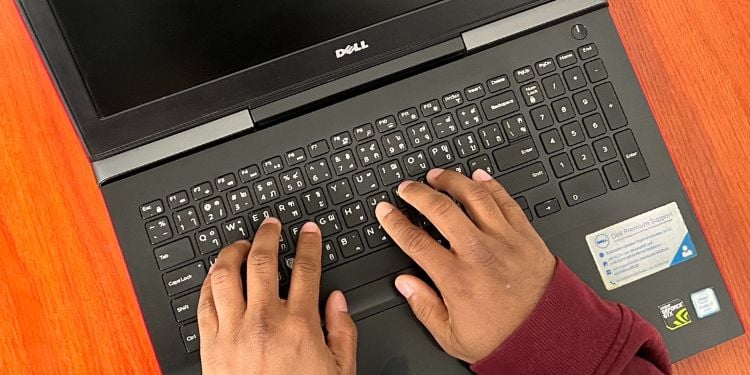Ah, the dreaded laptop keyboard malfunction! Typing suddenly turns into a tap-dancing routine, frustration mounts, and deadlines loom. Fear not, tech warriors! Here’s a toolbox of quick fixes to revive your unresponsive keys and restore keyboard harmony:
Basic Troubleshooting Tips
Try these simple, first-line solutions before diving into more complex troubleshooting:
1. Restart Your Laptop
Sometimes, a simple reboot can work wonders. Restarting clears temporary glitches from memory and refreshes all system processes. This can potentially revive an unresponsive keyboard.
To restart your Windows 10 laptop, click on the Start button and select the Power icon. Then choose Restart. If your laptop runs on Windows 8 or earlier versions, press and hold the Shift key while clicking the Power button in the Charms bar or Start screen. Select Restart.
2. Disconnect External Devices
Keyboards, mice or other USB devices connected to your laptop can sometimes interfere with its built-in keyboard. Unplug all external devices and see if the keyboard malfunction persists. If disconnecting peripherals fixes your issue, try updating their drivers or use different ports to connect them.
3. Inspect for Foreign Objects
Sticky or repeating keys can often be caused by small particles like breadcrumbs, dust bunnies or even spilled liquids trapped underneath. Here are some ways to dislodge debris:
- Turn off the laptop and flip it keyboard-side down. Gently shake and tilt to let gravity pull out any loose particles.
- Use a can of compressed air to blast air into cracks between keys. This dislodges bits of food, dirt etc. clogging mechanisms.
- Use a small brush like a toothbrush to sweep debris out from between tight spaces.
4. Update Keyboard Drivers
Outdated, buggy or corrupted drivers can cause keyboard issues. Download the latest drivers specifically for your laptop model from the manufacturer’s website and install them.
To update drivers on Windows:
- Open Device Manager by right-clicking the Start button and selecting it
- Expand the “Keyboards” section
- Right-click the keyboard device and select “Update driver”
- Select “Search automatically for updated driver software”
- Restart your laptop after the update completes
5. Run the Built-in Keyboard Troubleshooter
Windows has an automated Keyboard troubleshooter that checks for common problems and attempts to fix them automatically.
To run it:
- Go to Start and type “troubleshooting”
- Open “Troubleshooting” and select “View All”
- Click on “Keyboard” to launch the troubleshooter
- Follow the on-screen directions and apply fixes if prompted
- Restart when complete
Advanced Troubleshooting
If basic steps don’t resolve the issue, try these advanced troubleshooting techniques:
1. Disable Filter Keys
Filter Keys is an accessibility feature that can cause delays between keystrokes. To disable:
- Go to Start and type “ease of access keyboard settings”
- Under Filter Keys, toggle the feature Off
- Click Apply > OK and exit out of settings
2. Adjust Keyboard Settings
Keyboard settings like character repeat rates and key sensitivity can sometimes get changed, leading to missed strokes. To optimize:
- Go to Start and type “control panel”
- Open Control Panel > Clock & Region > Language
- Click on “Change keyboards or other input methods”
- Select your keyboard > click Change Keyboards
- Adjust settings like repeat delay/rate, click speed etc.
3. Boot Into Safe Mode
Safe Mode starts Windows with only the bare essential drivers and services. If your keyboard works normally here, it indicates a software conflict.
To enter Safe Mode:
- Open the Power Options menu as above
- Hold down the Shift key and select Restart
- On boot, choose Troubleshoot > Advanced > Startup Settings
- Select Safe Mode and test keyboard
- Exit and restart normally
Last Resort: Hardware Service
If you’ve tried all of the above in vain, the problem may be hardware-related – a damaged key switch, frayed cable, stuck hinge or even motherboard issue. Consult an experienced technician for diagnosis and repair.
Some keyboard hardware faults like stuck keys may be self-fixable. But repairs for internal breaks require skill and proper tools. Avoid amateur tinkering that could damage the laptop further.
Preventative Care
Here are some handy tips to keep your laptop keyboard humming and minimize future fumbles:
- Use keyboard covers to protect your keys from spills, crumbs and wear/tear
- Don’t eat or smoke above your laptop
- Clean keys once a month using gentle cleanser/brush
- Be gentle while transporting and using your laptop
- Update keyboard drivers whenever prompted by your OS
When in Doubt, Consult The Manual
As a rule of thumb, always check your laptop manufacturer’s website or user manual for model-specific troubleshooting.
Additionally, forums like Microsoft Community also provide tailored solutions for Windows keyboard problems.
While the quick fixes here may provide temporary relief or clues, long-term solutions ultimately lie in understanding the root cause. Combining generic steps with targeted measures for your make/model works best.
Remember – patience and persistence are key! With some thoughtful trials, your keyboard is sure to regain its pep.
So try these handy troubleshooters first before panicking or rushing to the repair shop. Very often, a few simple reboots or tweaks can get those keys tapping again. Happy typing!
















Add Comment